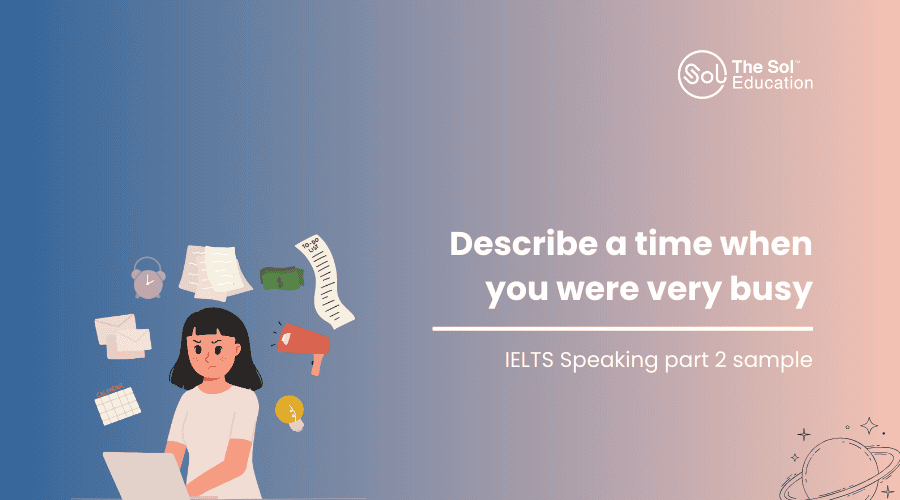Cùng The SOL Education chữa đề thi IELTS Speaking part 2 Describe a time when you were very busy và trả lời các câu hỏi IELTS Speaking part 3 liên quan nhé.
Cùng The SOL Education chữa đề thi IELTS Speaking part 2 Describe a time when you were very busy và trả lời các câu hỏi IELTS Speaking part 3 liên quan nhé.

IELTS Speaking part 2
1. Đề bài
Describe a time when you were very busy
You should say:
- When it happened
- Where you were
- What you did
- And explain why you were very busy
2. Sample answer 1
There have been many times when I’ve been really busy, but a time that immediately comes to mind is when I was preparing for an art exhibition with a friend in university. I’ll try to explain what went on. Basically, I was in charge of an art exhibition of paintings from a South American painter for the university Spanish department. You see, I was one of the main students, let’s say, in the third year, and so I got involved in all sorts of exchange programmes and things like that. Anyway, there was this South American art exhibition which was to be hosted for two weeks in one of the gallery spaces in the next campus. I was in charge of making sure all the paintings were unpacked and put up in the gallery after the shipment arrived at the department, and advertising the exhibition, and organizing the opening event. You see, there’s always an opening event at art exhibitions, where you provide wine and snacks and there’s a little talk and an introduction to the artist and some of their paintings, and all of that. You see, the artist herself could not attend, so I was kind of representing her.
The reason I was really busy was because I had to juggle different things all at the same time, or at least it seemed like it. I had to not only ensure that all the paintings were unpacked very carefully, then put up on the exhibition walls in the exact way that the artist had explained (she provided a diagram and explanation of how to lay them out), then stick labels under each painting, that corresponded to the labels on the back, and then work with some computer designers to make fliers, and advertisements for the event, make an invitation list…. then organize the catering, the snacks and wine…. you can imagine! All of that to host a gallery exhibition opening. And I was determined to do a good job, because, on top of all that I had to manage a photographer and videographer to take photos and film the event, to put on the artist’s website.
So, basically for several weeks before the exhibition, and especially in the days preceding the exhibition, I was incredibly busy, and quite stressed out, and trying to keep everything and everybody who was involved in the project, in order and properly organized so the event was a success.
Từ vựng tham khảo:
- Juggle (verb): /ˈʤʌgəl/ - Điều phối, làm nhiều công việc cùng một lúc.
- Exchange Programmes (noun phrase): /ɪksˈʧeɪndʒ ˈproʊˌgræmz/ - Chương trình trao đổi.
- Gallery Space (noun phrase): /ˈɡæləri speɪs/ - Khu vực trưng bày nghệ thuật.
- Introduction (noun): /ˌɪntrəˈdʌkʃən/ - Sự giới thiệu.
- Representing (verb): /ˌrɛprɪˈzɛntɪŋ/ - Đại diện, thay mặt.
- Juggling Different Things (phrase): /ˈʤʌgəlɪŋ ˈdɪfərənt θɪŋz/ - Điều phối nhiều công việc khác nhau.
- Unpack (verb): /ʌnˈpæk/ - Mở gói, rải hàng từ bọc.
- Stick Labels (phrase): /stɪk ˈleɪbəlz/ - Dán nhãn.
- Correspond to (verb phrase): /ˌkɒrəˈspɒnd tʊ/ - Tương ứng với.
- Fliers (noun): /flaɪərz/ - Tờ rơi quảng cáo.
- Advertisement (noun): /ədˈvɜːrtɪsmənt/ - Quảng cáo.
- Catering (noun): /ˈkeɪtərɪŋ/ - Dịch vụ ẩm thực.
3. Sample answer 2
I vividly recall a time during my last year of high school when I was exceptionally busy. It happened in the weeks leading up to our final exams, typically in May.
I was at my home, in my room, surrounded by textbooks, notebooks, and a stack of revision materials. The looming final exams were approaching, and I was deep into the revision grind. I had numerous subjects to cover, from math and literature to history and science. During this period, my daily routine was consumed by studying for long hours, attending extra classes, and working on practice exams. The pressure to perform well in the final exams, which held significant importance for university admissions, contributed to the heightened level of busyness.
Apart from academic commitments, I was also involved in extracurricular activities and volunteer work. Balancing all these responsibilities required meticulous planning and time management. The reason for being so busy was the culmination of academic demands, the intensity of final exams, and my desire to excel in both academics and extracurriculars. The stakes were high, and the sense of responsibility towards my future goals compelled me to dedicate every available moment to my studies.
In retrospect, while it was an incredibly busy and challenging time, it taught me valuable lessons in time management, resilience, and the importance of balancing academic and personal commitments.
Từ vựng hữu ích:
- Looming (adjective): /ˈluːmɪŋ/ - Ngày càng gần, đe dọa.
- Revision (noun): /rɪˈvɪʒən/ - Ôn tập.
- Grind (noun): /ɡraɪnd/ - Sự làm việc chăm chỉ, siết chặt.
- Meticulous Planning (noun phrase): /məˈtɪkjʊləs ˈplænɪŋ/ - Lập kế hoạch tỉ mỉ.
- Time Management (noun phrase): /taɪm ˈmænɪdʒmənt/ - Quản lý thời gian.
- Culmination (noun): /ˌkʌlmɪˈneɪʃn/ - Sự đạt đến đỉnh điểm, kết hợp.
- Extracurricular Activities (noun phrase): /ˌɛkstrəkəˈrɪkjʊlər ækˈtɪvɪtiz/ - Hoạt động ngoại khóa.
- Balancing Responsibilities (phrase): /ˈbælənsɪŋ rɪˌspɒnsəˈbɪlətiz/ - Cân bằng trách nhiệm.
- Meticulous (adjective): /məˈtɪkjʊləs/ - Tỉ mỉ, kỹ lưỡng.
- Stakes Were High (phrase): /steɪks wər haɪ/ - Các mức độ rủi ro/ca cược cao.
- Sense of Responsibility (phrase): /sɛns əv rɪˌspɒnsəˈbɪləti/ - Ý thức trách nhiệm.
- Future Goals (noun phrase): /ˈfjʊtʃər ɡoʊlz/ - Mục tiêu tương lai.
- Dedicate (verb): /ˈdɛdɪˌkeɪt/ - Hiến dâng, dành hết.
- Valuable Lessons (noun phrase): /ˈvæljuəbl ˈlɛsənz/ - Bài học quý giá.
- Time Management (noun phrase): /taɪm ˈmænɪdʒmənt/ - Quản lý thời gian.
- Resilience (noun): /rɪˈzɪliəns/ - Sự kiên cường.
IELTS Speaking part 3
1. Why do people often feel tired in this day and age?
- Sample 1: In the modern era, people often feel tired due to the fast-paced lifestyle, demanding work schedules, and increased screen time. The prevalence of technology, long working hours, and a constant flow of information contribute to mental and physical fatigue.
- Sample 2: In the contemporary era, the prevalence of hectic lifestyles and demanding work schedules contributes significantly to widespread fatigue. Moreover, the constant connectivity through technology and the pressure to meet high standards in both personal and professional spheres contribute to mental and physical exhaustion.
2. Do you think people will feel even more tired in the future?
- Sample 1: It's possible that people may feel more tired in the future due to ongoing technological advancements, potential increases in job demands, and the challenges associated with balancing work and personal life. However, it also depends on societal changes, health awareness, and efforts to prioritize well-being.
- Sample 2: It's conceivable that individuals may experience heightened fatigue in the future due to the accelerating pace of technological advancements and potential increases in job demands. However, societal awareness and proactive measures to prioritize well-being could also lead to more balanced lifestyles, mitigating the extent of fatigue.
3. How does technology help with time management?
- Sample 1: Technology aids time management through various tools such as calendars, task organizers, and productivity apps. These tools help individuals schedule tasks efficiently, set reminders, and track progress. Additionally, communication tools enable faster collaboration, saving time in professional and personal contexts.
- Sample 2: Technology serves as a powerful ally in efficient time management through tools such as digital calendars, task organizers, and productivity apps. These tools not only facilitate the organization of tasks but also enable real-time collaboration and communication, fostering productivity in both professional and personal spheres.
4. Are you often busy?
- Sample 1: Yes, I do find myself often busy. Balancing work, studies, and personal commitments requires effective time management. While being busy can be challenging, it also provides a sense of accomplishment and keeps me motivated.
- Sample 2: Indeed, I find myself frequently engaged in a variety of activities, balancing work, academic pursuits, and personal commitments. While this schedule can be demanding, the challenge fuels my sense of accomplishment and drive for continual improvement.
5. What are the advantages and disadvantages when people keep busy?
- Sample 1: Keeping busy can lead to increased productivity, achievement of goals, and personal growth. However, it may also result in stress, fatigue, and a lack of work-life balance. Striking a balance is crucial to enjoy the benefits of being busy without compromising well-being.
- Sample 2: Keeping busy can yield numerous advantages, including heightened productivity, goal achievement, and personal development. However, it is essential to acknowledge the potential downsides, such as increased stress and a compromised work-life balance. Striking a delicate equilibrium is imperative to harness the benefits without sacrificing overall well-being.
6. Do you think children should learn through playing games or under pressure?
- Sample 1: Children learn best through a combination of play and structured learning. While play fosters creativity, social skills, and joy in learning, some level of structure is essential for academic and skill development. Striking a balance between play and structured learning ensures holistic education for children.
- Sample 2: The optimal approach to childhood education involves a harmonious blend of playful learning and structured education. Playful activities stimulate creativity, social skills, and a love for learning, while a structured framework ensures essential academic and skill development. A balanced approach provides a holistic foundation for a child's education.
Hy vọng bài viết này sẽ giúp ích cho các bạn trong quá trình chuẩn bị cho kỳ thi IELTS Speaking.
Chúc các bạn học thật tốt nhé!

